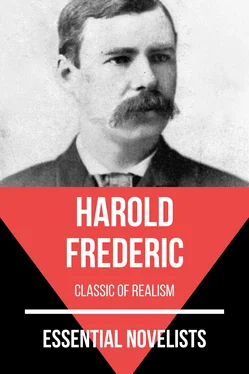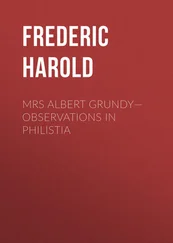Title Page
Author
In the Valley
The Damnation of Theron Ware Конец ознакомительного фрагмента. Текст предоставлен ООО «ЛитРес». Прочитайте эту книгу целиком, купив полную легальную версию на ЛитРес. Безопасно оплатить книгу можно банковской картой Visa, MasterCard, Maestro, со счета мобильного телефона, с платежного терминала, в салоне МТС или Связной, через PayPal, WebMoney, Яндекс.Деньги, QIWI Кошелек, бонусными картами или другим удобным Вам способом.
About the Publisher Конец ознакомительного фрагмента. Текст предоставлен ООО «ЛитРес». Прочитайте эту книгу целиком, купив полную легальную версию на ЛитРес. Безопасно оплатить книгу можно банковской картой Visa, MasterCard, Maestro, со счета мобильного телефона, с платежного терминала, в салоне МТС или Связной, через PayPal, WebMoney, Яндекс.Деньги, QIWI Кошелек, бонусными картами или другим удобным Вам способом.

Harold Frederic, (born Aug. 19, 1856, Utica, N.Y., U.S.—died Oct. 19, 1898, Henley-on-Thames, Oxfordshire, Eng.), American journalist, foreign correspondent, and author of several historical novels.
Interested at an early age in photography and journalism, Frederic became a reporter and by 1882 was editor of the Albany Evening Journal. In 1884 he went to London as the correspondent for The New York Times. He remained there for the rest of his life. In 1884 he made a hazardous tour investigating outbreaks of cholera in southern France and Italy. In 1891 he visited Russia to investigate the persecution of the Jews.
His historical novels range from the American Revolution (In the Valley, 1890) to the American Civil War (The Copperhead, 1893, and Marsena and Other Stories, 1894). Of his New York State novels, The Damnation of Theron Ware (1896; English title Illumination), the story of the decline and fall of a Methodist minister, brought him his greatest fame. Three other novels, March Hares (1896), Gloria Mundi (1898), and The Market Place (1899), are about English life.
"The French Are in the Valley!"
––––––––
It may easily be that, during the many years which have come and gone since the eventful time of my childhood, Memory has played tricks upon me to the prejudice of Truth. I am indeed admonished of this by study of my son, for whose children in turn this tale is indited, and who is now able to remember many incidents of his youth—chiefly beatings and like parental cruelties—which I know very well never happened at all. He is good enough to forgive me these mythical stripes and bufferings, but he nurses their memory with ostentatious and increasingly succinct recollection, whereas for my own part, and for his mother's, our enduring fear was lest we had spoiled him through weak fondness. By good fortune the reverse has been true. He is grown into a man of whom any parents might be proud—tall, well-featured, strong, tolerably learned, honorable, and of influence among his fellows. His affection for us, too, is very great. Yet in the fashion of this new generation, which speaks without waiting to be addressed, and does not scruple to instruct on all subjects its elders, he will have it that he feared me when a lad—and with cause! If fancy can so distort impressions within such short span, it does not become me to be too set about events which come back slowly through the mist and darkness of nearly threescore years.
Yet they return to me so full of color, and cut in such precision and keenness of outline, that at no point can I bring myself to say, "Perhaps I am in error concerning this," or to ask, "Has this perchance been confused with other matters?" Moreover, there are few now remaining who of their own memory could controvert or correct me. And if they essay to do so, why should not my word be at least as weighty as theirs? And so to the story:
I was in my eighth year, and there was snow on the ground.
The day is recorded in history as November 13, A.D. 1757, but I am afraid that I did not know much about years then, and certainly the month seems now to have been one of midwinter. The Mohawk, a larger stream then by far than in these days, was not yet frozen over, but its frothy flood ran very dark and chill between the white banks, and the muskrats and the beavers were all snug in their winter holes. Although no big fragments of ice floated on the current, there had already been a prodigious scattering of the bateaux and canoes which through all the open season made a thriving thoroughfare of the river. This meant that the trading was over, and that the trappers and hunters, white and red, were either getting ready to go or had gone northward into the wilderness, where might be had during the winter the skins of dangerous animals—bears, wolves, catamounts, and lynx—and where moose and deer could be chased and yarded over the crust, not to refer to smaller furred beasts to be taken in traps.
I was not at all saddened by the departure of these rude, foul men, of whom those of Caucasian race were not always the least savage, for they did not fail to lay hands upon traps or nets left by the heedless within their reach, and even were not beyond making off with our boats, cursing and beating children who came unprotected in their path, and putting the women in terror of their very lives. The cold weather was welcome not only for clearing us of these pests, but for driving off the black flies, mosquitoes, and gnats which at that time, with the great forests so close behind us, often rendered existence a burden, particularly just after rains.
Other changes were less grateful to the mind. It was true I would no longer be held near the house by the task of keeping alight the smoking kettles of dried fungus, designed to ward off the insects, but at the same time had disappeared many of the enticements which in summer oft made this duty irksome. The partridges were almost the sole birds remaining in the bleak woods, and, much as their curious ways of hiding in the snow, and the resounding thunder of their strange drumming, mystified and attracted me, I was not alert enough to catch them. All my devices of horse-hair and deer-hide snares were foolishness in their sharp eyes. The water-fowl, too—the geese, ducks, cranes, pokes, fish-hawks, and others—had flown, sometimes darkening the sky over our clearing by the density of their flocks, and filling the air with clamor. The owls, indeed, remained, but I hated them.
The very night before the day of which I speak, I was awakened by one of these stupid, perverse birds, which must have been in the cedars on the knoll close behind the house, and which disturbed my very soul by his ceaseless and melancholy hooting. For some reason it affected me more than commonly, and I lay for a long time nearly on the point of tears with vexation—and, it is likely, some of that terror with which uncanny noises inspire children in the darkness. I was warm enough under my fox-robe, snuggled into the husks, but I was very wretched. I could hear, between the intervals of the owl's sinister cries, the distant yelping of the timber wolves, first from the Schoharie side of the river, and then from our own woods. Once there rose, awfully near the log wall against which I nestled, a panther's shrill scream, followed by a long silence, as if the lesser wild things outside shared for the time my fright. I remember that I held my breath.
Читать дальше















